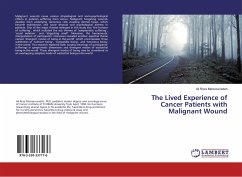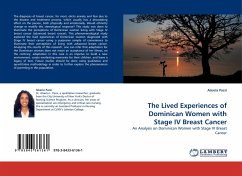
The Lived Experience of Cancer Patients with Malignant Wound
Versandkostenfrei!
Versandfertig in 6-10 Tagen
24,99 €
inkl. MwSt.

PAYBACK Punkte
12 °P sammeln!
Malignant wounds cause various physiological and socio-psychological effects in patients suffering from cancer. Malignant fungating wounds develop from underlying cancerous cells invading dermal tissue, which become malodorous and cause physical and psychological distress in patients. One of the major themes emerged in this study was 'the horizon of suffering', which included the sub themes of 'symptomatic suffering', 'social isolation', and 'disgusting smell'. Moreover, the hermeneutic interpretation of participants' interviews revealed another essential theme named 'divergent modes of being-...
Malignant wounds cause various physiological and socio-psychological effects in patients suffering from cancer. Malignant fungating wounds develop from underlying cancerous cells invading dermal tissue, which become malodorous and cause physical and psychological distress in patients. One of the major themes emerged in this study was 'the horizon of suffering', which included the sub themes of 'symptomatic suffering', 'social isolation', and 'disgusting smell'. Moreover, the hermeneutic interpretation of participants' interviews revealed another essential theme named 'divergent modes of being-in-the-world' which encompasses three subthemes of 'tolerant being', 'compatible being', and 'tenacious being' in-the-world. This research explored both varying meanings of participants' sufferings in symptomatic dimensions and divergent modes of existential being-in-the-world. These divergent modes of being may be considered as an overlapping adaptive mode of existential being-in-the-world.












